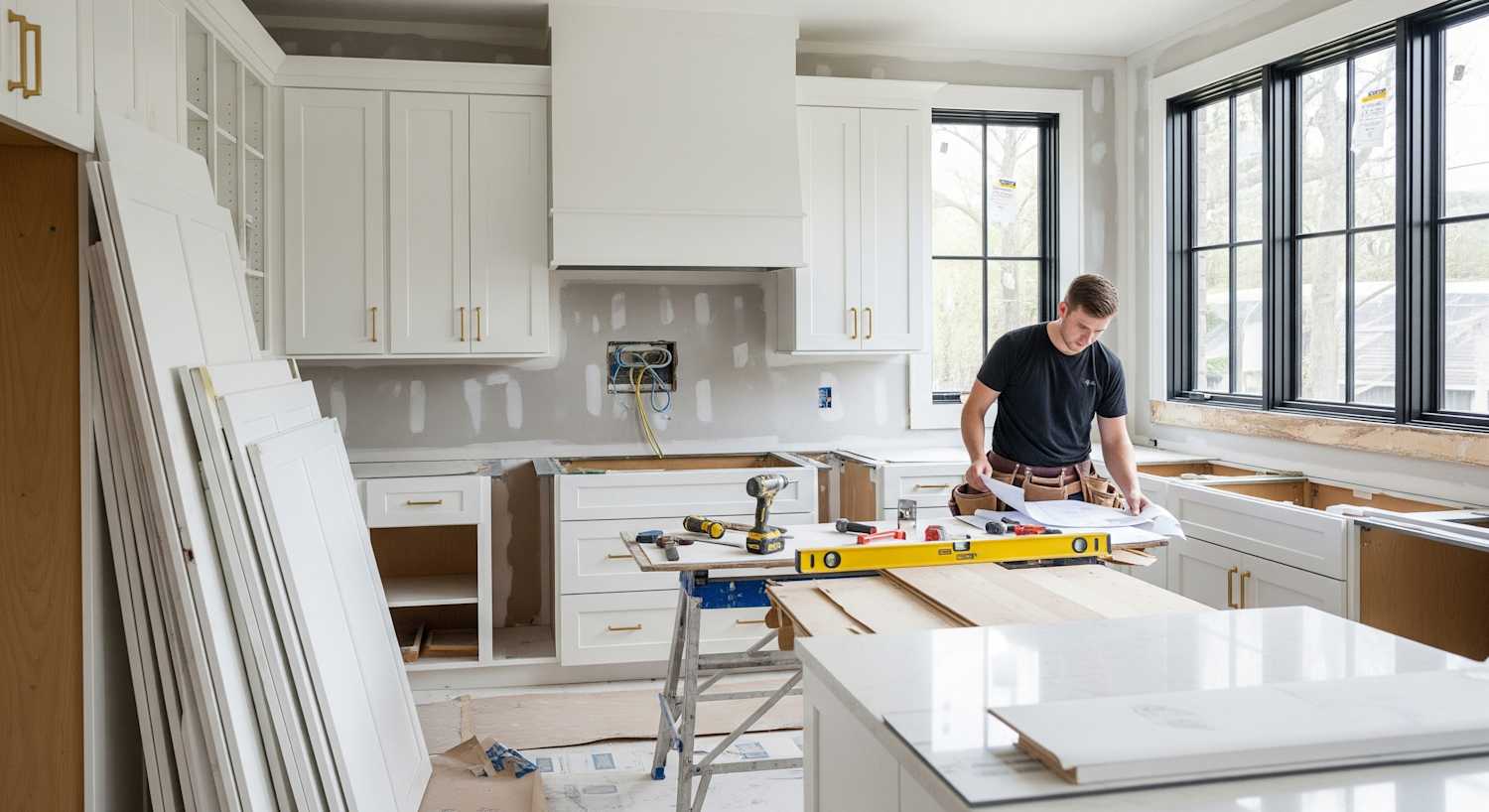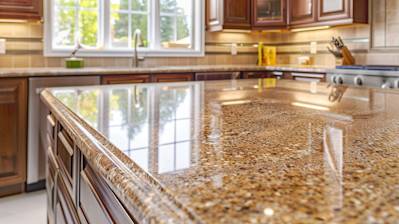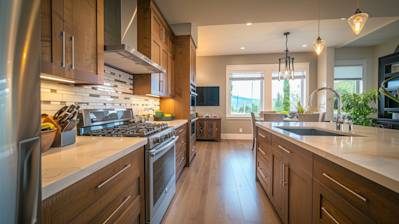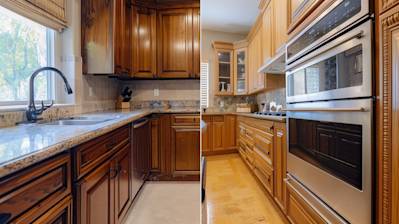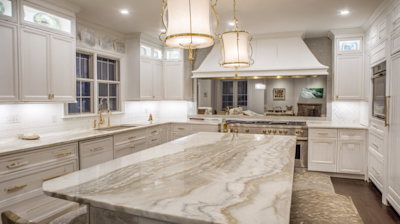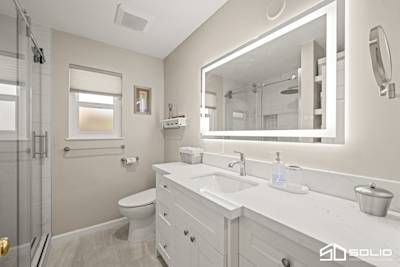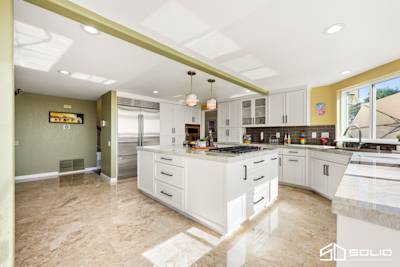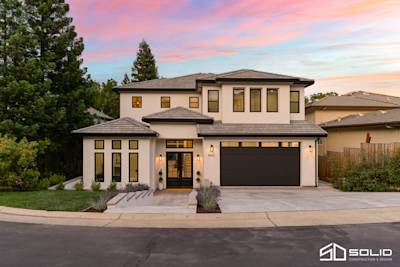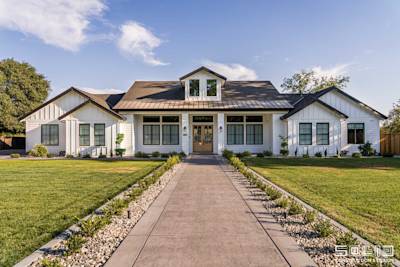When you decide it’s time to give your kitchen a makeover, there's a lot to consider. Color schemes, design ideas and new appliances all come to mind. But one important question is often overlooked initially: Do you need a permit to remodel a kitchen?
The answer isn’t as simple as "yes" or "no". It largely depends on the extent and type of remodeling work you’re planning to undertake. This comprehensive guide seeks to offer a clear picture on the subject.
The Nitty-Gritty of Remodeling Permits
In most localities across the United States, permits are a requirement for significant adjustments to a home's structure. This helps to ensure the work being done is up to code, which is crucial to maintaining the safety, functionality, and value of the home.
Permits are usually managed by the local building or planning department within your city or county government. Requirements might differ among municipalities, but generally, they all follow a similar process. This includes providing plans for the renovation, paying a permit fee, and undergoing inspections during and after the work to confirm everything is up to code.
Factors Determining the Need for a Kitchen Remodeling Permit
Several factors determine whether you need to seek a permit for your kitchen remodel:
Scope of Work: If your remodeling plans involve changes to the room's layout, such as moving or removing walls, you likely require a permit.
Plumbing and Electrical Changes: Projects involving relocation of the sinks or dishwasher, or adding new electrical outlets generally need permits.
Window and Door Changes: If you plan to relocate, enlarge or add new windows or doors, the chances are high you might need a permit.
HVAC Alterations: Any changes to your heating, ventilation or air conditioning systems typically require permits.
This is not an exhaustive list of factors as permit requirements can differ greatly depending on local regulations.
When are Permits not Necessary?
Generally, permits are not necessary when you plan a minor remodeling project. Here are a few scenarios:
Painting and Decoration: This typically includes painting your kitchen walls, updating light fixtures or putting in a new backsplash.
Appliance updates: Provided you are replacing the old appliance using existing electrical and plumbing hookups, permits are usually not needed.
Cabinet Replacement or Refacing: As long as the work doesn't affect the room's layout, a permit usually isn't required.
Again, it's crucial to confirm this information with your local building department, as there can be regional discrepancies in these regulations.
Importance of Kitchen Remodeling Permits
Obtaining the necessary permit might seem like an annoying step in the renovation process. However, taking the time to secure the right permits provides homeowners with the following benefits:
Safety: A permit ensures your remodel meets local building codes. Contractors must follow these guidelines designed to keep the residents safe.
Maintaining Property Value: If remodeling projects aren't up to code, it might lower the value of your house or cause difficulties when selling.
Compliance with Insurance Companies: Insurance providers may not cover damages caused by DIY renovations if performed without the necessary permits.
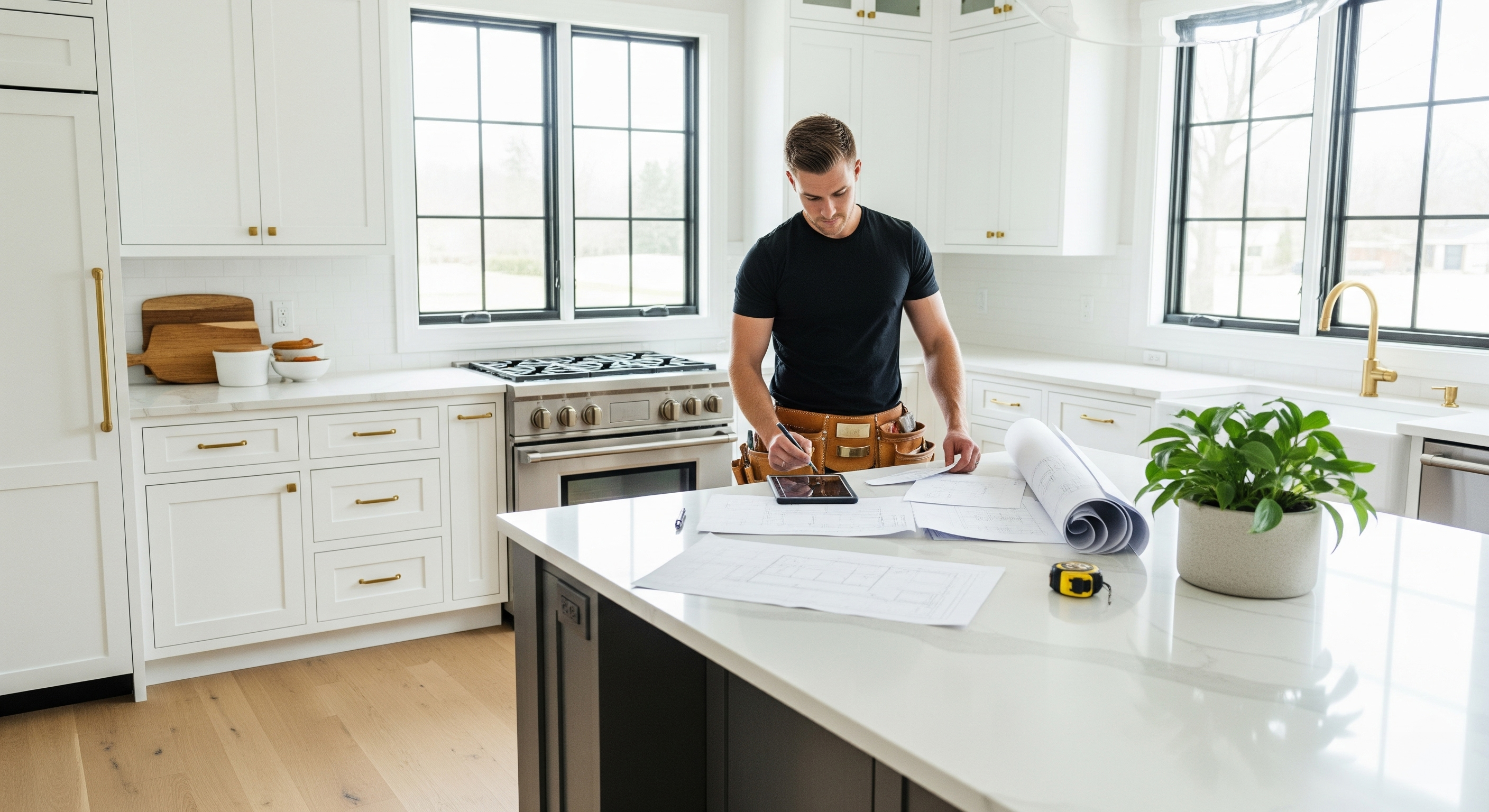
Frequently Asked Questions about Do You Need A Permit To Remodel A Kitchen
What happens if I remodel without a permit?
Remodeling without a permit, when one is required, can lead to fines and penalties. It could also pose challenges when you want to sell your house, as prospective buyers or their inspectors might require proof of permits for significant work. Remember, remodeling without a permit where one is needed can also impact on your homeowners insurance coverage.
Why do I need a permit to remodel my kitchen?
Kitchen remodeling permits are necessary mainly to ensure safety. They guarantee your remodeling plans are reviewed by an expert, who will ensure they meet local and state building codes. These codes ensure structural safety, fire safety, and health standards. Hence, a permit helps to protect you, your family, and future residents of your home.
How do I know if I need a permit for my kitchen remodel?
This could vary based on your location, but generally speaking, if you're simply replacing existing elements with new ones — like a new sink into an existing hole, or new cabinets on existing wall mounts — you probably won't need a permit. However, when modifying the structure or the systems within (like electrical or plumbing), permits are almost always required. Make sure to call your local building permit office for the most accurate information.
How do I get a permit for my kitchen remodel?
First, you'll need to complete an application form at your local building department. This will normally involve some kind of plan or design layout showing the proposed changes. After submitting, the application will be reviewed. If it meets all the requirements, you will receive your permit. The process can take anywhere from a few days to several weeks depending on the complexity of your project and the efficiency of your local building department.
How much does it cost to get a permit for a kitchen remodel?
The cost of a permit can vary based on the scope of the remodel and your location. It could be a standard fee or a percentage of the total cost of the project. It is advisable to reach out to your local permit office to get an estimate before you begin your project.
What happens after I obtain my kitchen remodel permit?
After you've obtained your remodeling permit, you can start your project. However, just because you have your permit doesn't mean you're done with the permitting department! During your remodeling process, inspections will be required to ensure the work is following the agreed-upon plans and is up to code. Be prepared to schedule these inspections at different stages of your project.
What if I bought a house where the kitchen was remodeled without a permit?
If you bought a house where work was done without the necessary permits, you could be on the hook for bringing everything up to code or potentially removing the unpermitted work. It's always a good idea to inquire about this when buying a house and ensure that any significant work done previously was properly permitted and inspected.
What are the risks associated with not getting a permit for kitchen remodeling?
Some risks associated with not getting a permit include safety issues, insurance coverage problems, fines, devaluation of your property, and possible legal issues when trying to sell your home. It's always best to play it safe and get the necessary permits before starting any major work.
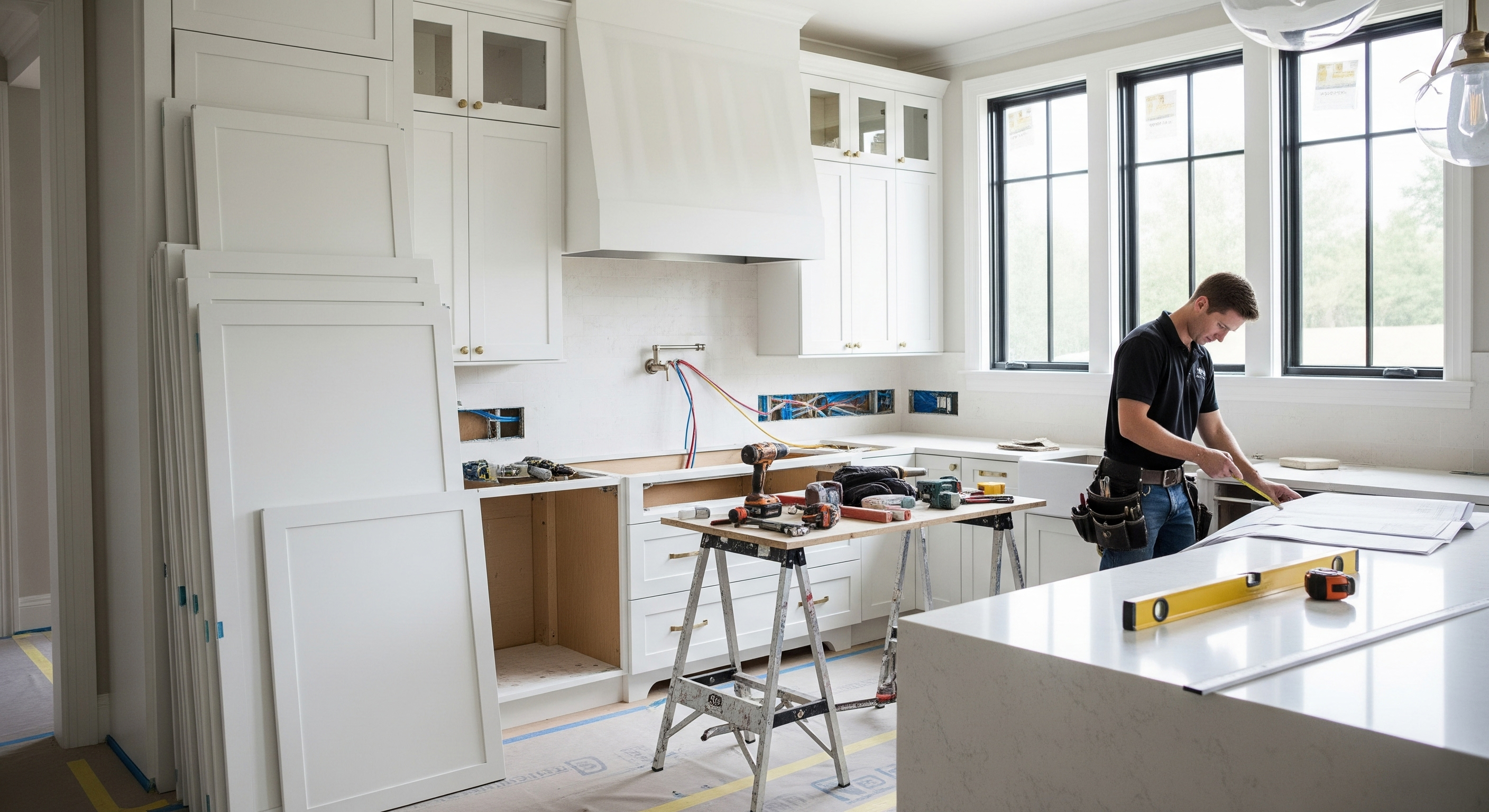
Pros of Getting a Permit to Remodel a Kitchen
Enhances Safety
Compliance with Building Codes
Acquiring a permit ensures your kitchen remodel complies with local building codes, which are in place to ensure safety. The permit process is designed to make sure that all structural, electrical, and plumbing changes or installations adhere to the rules and regulations set by the city or county. Complying with these codes reduces the risk of potential hazards in your home.
Professional Inspection
Obtaining a permit often calls for city or county inspector's visit at different stages of the remodeling process. These inspectors carry out thorough inspections ensuring everything, from electrical wiring to plumbing, is done to code. They can spot potential issues that may lead to problems in the future, thereby ensuring the safety of your remodel.
Increases Home Value
Enhances Resale Value
If you ever decide to sell your home, a kitchen remodel done with the proper permits can fetch an increased resale value. Potential buyers often check if the house renovations have been done legally with needed permits. They'd feel more at ease knowing all the necessary remodeling was done according to code, enhancing their confidence in the quality of your home.
Comprehensive Documentation
A permit for remodeling comes with records confirming the installations or changes made on your property are up to code, and are not posing any safety risks. This comprehensive documentation is useful during the selling process, as it can provide buyers proof that the remodel was done properly and legally.
Legal Protection
Avoid Legal Troubles
Not obtaining a permit can lead to legal issues and may even result in fines. By getting a permit, you can avoid unnecessary legal trouble and ensure that your remodeling project is protected under local law.
Protection Against Contractors
In case you're hiring a contractor, the permit process gives you protection. It's easier to track and rectify a bad job if the work has been permitted and inspected.
Cons of Getting a Permit to Remodel a Kitchen
Increases Expenses
Permit Costs
Permits cost money and depending on local regulations, building department guidelines, and the size of your remodeling project, these costs can add up. It's an added expense you'll need to consider in your remodeling budget.
Potential for Increased Tax
Home improvements done with a permit, especially those that increase house size, can lead to a higher property tax bill. Tax assessors can use the permit information to reassess the value of your home, which can lead to an increase in your property taxes.
Delays Project
Time-consuming Process
Acquiring a permit can take time. The hassle of paperwork, the time it takes for approval to come through, and finding the right time for inspections can delay your remodeling project.
Inspector’s Schedule
Inspections are usually done at various stages of the remodel. Coordinating with the inspector's schedule can be challenging and potentially cause delays if the times don't align with yours or your contractor's timeline.
Unwanted Scrutiny
Other Non-Permitted Improvements
When an inspector comes for a visit, they might notice other improvements in your home done without necessary permits. This unwelcome scrutiny can potentially open up a can of worms leading to fines.
Neighbor’s Awareness
A visible permit might alert nosey neighbors of your remodeling project. They could then potentially complain about the noise or other nuisance caused by the project, leading to unwanted conflicts.
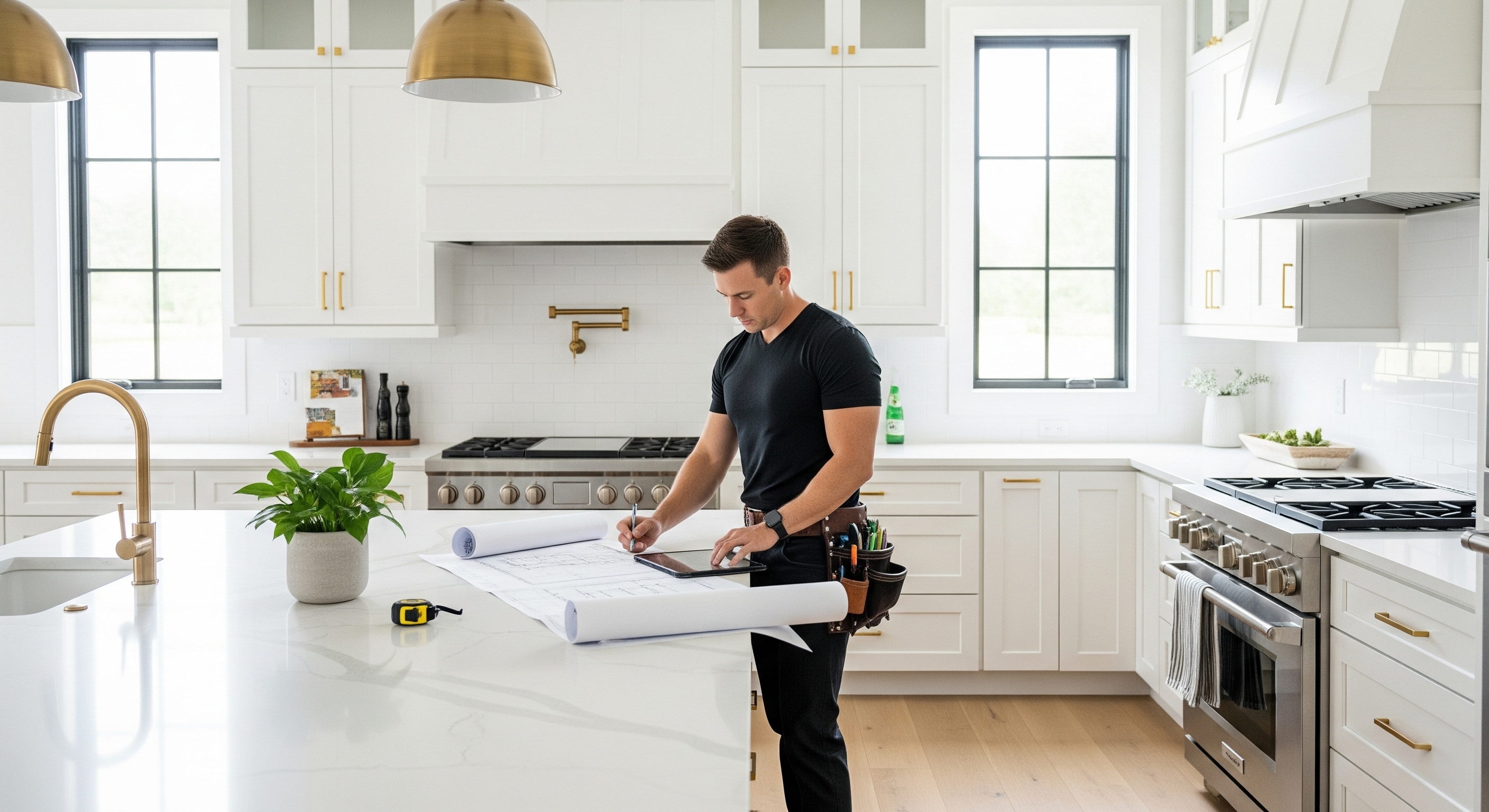
Myths and Misconceptions about Kitchen Remodeling Permits
Numerous misconceptions surrounding the necessity of remodeling permits, especially when it comes to kitchens, might be confusing for many homeowners. Hence, it's crucial to debunk these myths to help you understand the real essence of obtaining permits for kitchen remodels and why it's not something to skimp.
Myth 1: Small Changes Don't Require Permits
False Assumption That Minor Remodels Don't Need Permits
A common misconception is that if you're just making minor changes to your kitchen like upgrading your cabinets or countertops, or installing new appliances, you don't need a permit. This, however, can be misleading and might not hold true entirely. Any project that involves structural changes to your home typically requires a permit regardless of how minor the work may seem.
Under-the-Radar Work Could Haunt Later
Undertaking without a permit might seem like a quick fix, but down the line, when it's time to sell your house or apply for insurance, unpermitted work could become a significant hurdle.
Myth 2: Permits are Unnecessary Red Tape
Permit Process: A Hassle or Safety Measure?
Many homeowners view the process of obtaining a permit as a means for local governments to generate additional revenue or as mere bureaucratic red tape. However, the truth is, it's a safety measure designed to ensure all work complies with local building codes and regulations.
Building Codes: More than just Rules
People may argue that building codes are arbitrary and restricting innovation. Still, these codes are there for a reason — drawn from safety practices, past building failures, and experiences to ensure homeowner and public safety.
Myth 3: Permits Slow Down the Project
Permits: A Project Slowdown or A Preventive Measure?
There's a common perception that the process of securing permits takes too long and slows down the project timeframe. However, while it might take some time, getting a permit can save you from future headaches caused by work not being up to code.
Permit Inspections: Not a Delay, rather an Assistance
The necessary inspections tied to permits shouldn't be viewed as obstacles delaying your project completion. Instead, they can serve as additional pairs of eyes that can catch problems before they become costly issues, saving you from potential major setbacks in your remodeling project.
Myth 4: You'll End Up Paying More Taxes
Higher Tax Myth: Debunked!
One deterrent for some homeowners in getting permits is the fear of increased property taxes. The theory goes that if you improve your house (thereby increasing its value), you inevitably pay more taxes. While it is true that significant home improvements can result in a tax increase, this is typically marginal and offset by the increase in the home's value.
Viewing the Bigger Picture
It's essential to consider the cost of non-compliance. The potential fines for unpermitted construction work can significantly exceed the marginal increase in property taxes due to home improvements.
Myth 5: All Contractors Take Care of Permits
Assuming Contractor Responsiveness for Permits
Another common misconception is that hiring a contractor means they will automatically handle all necessary permits. Not all contractors take this responsibility and, even if they do, it is still the homeowner's legal responsibility to ensure all required permits have been obtained.
Ensuring Contractor Accountability
While your contractor can help you navigate through the process, it’s always good to verify that proper permits have been secured. It protects you from potential legal trouble and ensures your project is up to code. This also documents that the contractor did a proper job.
A clear understanding of these myths and misconceptions can help you navigate your kitchen remodeling process more wisely, ensuring not only that it complies with all required codes and regulations but also it adds value instead of unexpected troubles in the future. Always remember: when it comes to remodeling, permits aren’t burdens, they’re protections.
Summary
So, let's ask again, do you need a permit to remodel a kitchen? If you're making changes to your home's structure or plumbing, electrical, or mechanical systems, you'll typically need to pull permits. These permits help ensure that the work is done safely and according to local building codes. It might seem like an extra step, but really it's all about keeping your home safe and up to standards.
If you're still confused about whether you need a permit to transform your cookery space, don't worry, you're not alone. It really depends on the scale of your renovation. For small updates like painting, changing fixtures, or replacing cabinets, you generally won't need one. However, for larger projects involving wiring, plumbing, or moving walls, it's likely required. Make sure to check with your local government or a professional contractor before you start your project.
Remember, while getting a permit for a kitchen remodel might seem like a hassle, there's a good reason for it. Besides ensuring safety, this process can also save you from costly issues in the future. Not getting a permit when you need one can lead to fines and could bring up issues when you decide to sell your home. So, to preserve your peace of mind, do your homework and find out if you need a permit to remodel your kitchen.
About Solid Construction & Design
Solid Construction & Design is a family-owned and operated business based in Sacramento, CA. With a strong legacy of superior craftsmanship, our expert team specializes in home renovations, kitchen remodels, bathroom remodels, room additions, and even custom home construction. We believe in building more than just beautiful homes; we believe in building relationships. Over the years, we’ve adhered to our core values of honesty, transparency, and quality, making us the trusted partner for countless homeowners in the Sacramento area for their construction and design needs. With Solid Construction & Design, your dream of a perfect home can become a solid reality.

